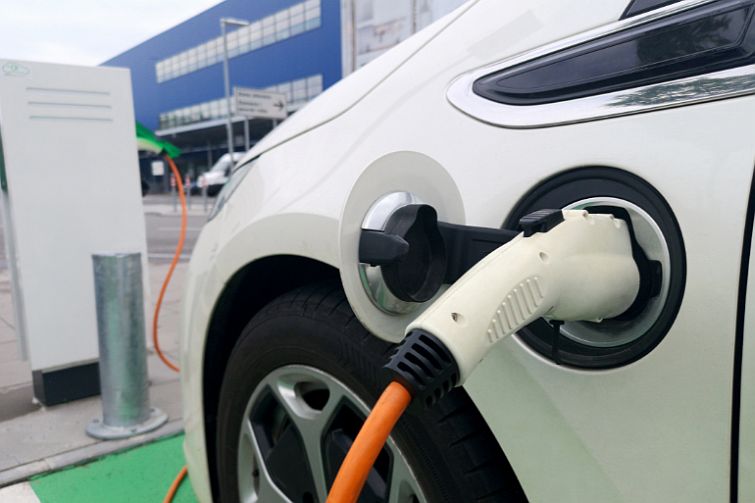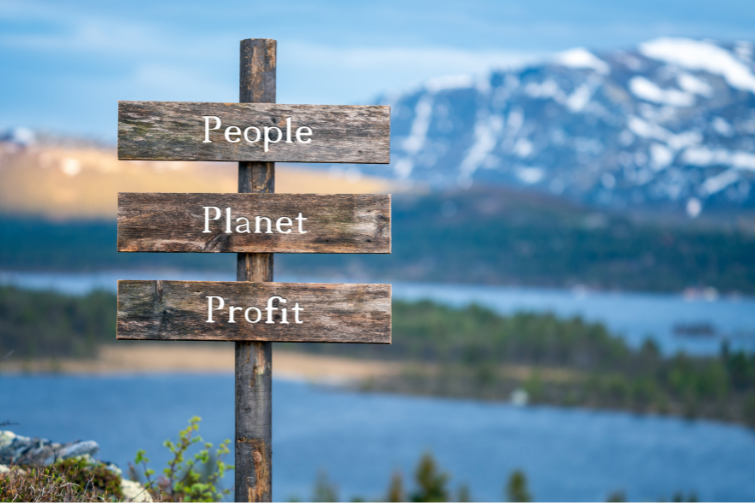Share This Article
The triple bottom line and conscious capitalism are gaining traction. Businesses are more aware of the need to approach the climate crisis and social injustices from an ESG (Environmental, Social and Governance) perspective.
The triple bottom line – what does it mean?
The triple bottom line means valuing people, planet and profit – preferably with a common measure. In recent decades businesses have been primarily focused on making profit. They have not included the value of natural capital in their balance sheets. They have seen the resources provided by Nature as free for the taking. Many companies have used water from rivers – often depriving local communities – or polluted waterways through their manufacturing processes. Others have cut down trees in the rainforest to make way for palm oil or soya plantations. We examined some of the effects of human activity in our blog about biodiversity.
Then there is human and social capital which relates to staff and supply chains as they are impacted by business operations. The ‘social’ element covers the communities in which a business operates and any negative and positive impacts that business generates.
Jeremy Nicholls is a Director of Social Value International and an Ambassador for the Capitals Coalition. He explains, “Organisations will overclaim but at the same time underperform on their impact if they are not held to account by the people who are affected by their activities. There are three key areas that businesses should address in their sustainability strategies: materiality, valuation and assurance.” This approach should be used to ensure that an organization considers its dependencies and the consequences of its operations on natural, social and human capital. And, most importantly, if the information is to be useful, the data must be complete and audited by a third party. Thus acting in the interests of those experiencing the consequences in the same way that company accounts would be.
Why adopt the triple bottom line approach?

Simply, because it makes business sense. On many different levels. Firstly, countless insights show that consumers are looking to buy from businesses who are doing the right thing, both environmentally and socially. They are likely to show more brand loyalty, will recommend to friends and will pay more for products from purpose driven brands. The Edelman Trust Barometer 2021 discovered that businesses are the only institutions which are seen as ethical and competent. This is the first time ever that business has come before government and NGO’s. It shows that consumers are expecting businesses to lead on sustainability.
Talent acquisition and retention is also a driver to become purpose led. Employees, particularly Millennials and Gen Z, are drawn to businesses who are committed to sustainability. They would work harder and be prepared to earn less. Powerful insights when you consider that these two generations make up half of the world’s population and the majority of the global workforce.
Of course, these assumptions about consumer and employee habits are based on insights. Many in the C-Suite will want to know that adopting sustainability as part of their business model is financially sound. A recent United Nations report discovered that organizations that focus on sustainability are performing better. The higher the ESG – the higher the profitability. A study by Oxford University in 2019 showed that good sustainability has a positive impact on performance. 90% improved cost of capital; 88% improved operational performance; 80% positive influence on share performance.
A convincing real example is global corporation, Unilever. Their purpose-driven brands have seen overall growth of 69%. Recently appointed CEO, Alan Jope, said “We will dispose of brands that we feel are not able to stand for something more important than just making your hair shiny, your skin soft, your clothes whiter or your food tastier.”
Lastly, investors are demanding more robust information about sustainability as they view issues such as climate change as risks. Investing is all about measuring risk and return.
The world of finance is changing

With all the goodwill in the world it is a given that, for sustainability to be adopted in all business sectors, investment must be available. And it is happening. More and more organizations are divesting from fossil fuels. Investors are looking at ESG as part of their risk assessments and they are particularly interested in seeing that the right team is in place to implement and measure sustainability strategies. According to a report by the Weinreb Group into the rise of ESG in the C-Suite, the role of Chief Sustainability Officer (CSO) increased by 228% between 2011 and 2021. There is also good news on gender equality with 54% of CSO’s being female but not so good on diversity with the majority in this role being white.
Until now banks have still tended to favor fossil fuels over green projects. In fact, according to a report by Greenpeace and WWF, the financial sector itself should be considered “high carbon” along with the oil and gas industry, coal mining, aviation and transport. If the UK’s biggest banks and investors were a country, they’d rank 9th in the world for the carbon emissions they’re responsible for. However, this looks set to change with the current global focus on climate change and the net zero targets which have been set by governments across the world.
The banking world itself is changing with organisations like the Global Alliance of Banking on Values (GABV). It is an independent network of banks using finance to deliver sustainable economic, social and environmental development. Then 43 banks from 23 countries have joined the Net Zero Banking Alliance, a UN Environment Program Finance Initiative.
In the US, this month sees the launch of the first branch of the Climate First Bank, a values-based community bank focusing on environmental sustainability. Their flagship location in St. Petersburg will serve as a model for responsible banking and the company hopes to open more branches across the state and beyond. Through their operations, they do their part to preserve America’s irreplaceable ecosystem by providing residents and businesses with convenient, specialized green loan options for everything ranging from rooftop solar to renewable energy to building retrofits, EV charging, or even purchasing certified carbon offsets. The bank has been set up by Ken LaRoe to specifically fight climate change and is based on the Triodos Bank model. Triodos was founded in the Netherlands in 1968 and now also operates in the UK, Germany, Spain and Belgium. It is also globally active as an investor through the Triodos Investment Management arm of the bank.
What could this approach mean to the tourism industry?

The tourism industry covers so many areas which all have an impact on sustainability: travel, buildings, food and beverage, cleaning and laundry, community engagement, destination management.
Transport is a substantial part of the traveler’s carbon footprint and hotels can make it easy for guests to offset their carbon – find out more about the Wayaj CFC Engine (™). Of course, they can also encourage eco-friendly transport whilst their guests are with them by offering bikes, e-bikes/scooters, electric vehicle chargers and use electric vehicles themselves.
Buildings are one of the largest generators of carbon emissions and there will always be savings to be made in energy and waste management. Food is a significant contributor to waste and changes to menus and purchasing policies can really help here – read our recent blog for ideas
The coronavirus pandemic has increased the focus on cleaning practices and often resulted in heightened use of toxic chemicals. However, there are many alternatives which are healthier for guests, staff and the planet. Then simple actions like allowing guests to choose to keep their towels and bedding for longer can reduce energy and water consumption/costs.
Tourism promotes destinations to travelers and so it makes perfect sense that the hospitality industry should be part of protecting those destinations. And not to forget the local communities who are living alongside those properties. Many destinations and accommodations are striving to have a positive impact on the ecosystems where they are located. They are also involving local people in their supply chains and staffing strategy so that the whole community thrives. You can read some examples of Wayaj hotel members involved in regenerative tourism in a previous blog.
The pandemic has really offered the tourism industry the opportunity to build back better and create a future which is more resilient and fair for all. Those businesses who decide to become involved in creating this future now will be recognized as purpose-driven brands.
Where to start?
If you are now convinced of the value of adopting the triple bottom line approach, the first question you will probably ask is ‘where do we start?’ It can seem a daunting task but there are tools and organisations who can help.
Many organisations begin by going through the United Nations Sustainable Development Goals (UN SDG’s). These 17 goals cover both social and environmental targets and it is worth going through them all as an organisation. This will help you identify where you can take immediate action but also where you will need more time to work out ways you could make a difference. As with anything connected to sustainability, it is always best to be honest about why you are unable to achieve something immediately. Sustainability is a journey and an honest approach should always be met with understanding – the important thing is that you have considered it and taken small steps forward.
You may have heard of a type of business called a ‘B Corps’. Certified B Corporations are a new kind of business that balances purpose and profit. They are legally required to consider the impact of their decisions on their workers, customers, suppliers, community, and the environment. B Corps share a global vision of an inclusive, equitable, and regenerative economic system for all people and the planet with a special focus on racial justice, climate action and stakeholder governance. Any for-profit business can actually complete the B Corp Impact Assessment before deciding whether to be certified. It is free and confidential.
Using that model, Jared Meyers, Chairman of Certified B Corp Legacy Vacation Resorts and co-founder of Florida for Good, has set up B Tourism, a global network of Certified B Corporation travel and tourism companies as well as other conscious travel organizations taking collective action for environmental and social justice. Inspired by the operational transparency and overall credibility of Certified B Corps, the platform serves as a resource for the regenerative travel movement and to help travelers enjoy a vacation experience that understands interdependence and interconnectedness. The platform is a welcoming space where the hospitality industry and tourism community can come together and share best practices, helpful guidance and informative resources while showing stakeholders that they place value on the triple bottom line (people, planet, prosperity).
The Capitals Coalition offers comprehensive protocols to help organizations create decision-making frameworks for natural capital as well as social & human capital. They have even developed a protocol specifically for the Food & Beverage industry.
Lastly, we at Wayaj can help you on your sustainability journey. By becoming a Wayaj hotel member, you will be required to complete our Hotel Sustainability Rating questionnaire, which will help you assess your performance across 7 pillars of sustainability: Community, Water, Energy, Materials & Resources, Indoor Environment, Waste and Management. There are inbuilt calculators to help you with measurement and you will also have access to our CFC Engine (™). This proprietary carbon footprint calculator will provide you and your guests with carbon emissions data based on your actual hotel and the specific accommodation you have on offer.
Sources:
https://www.edelman.com/trust/2021-trust-barometer
https://peakon.com/blog/employee-success/employee-expectations-2020/

